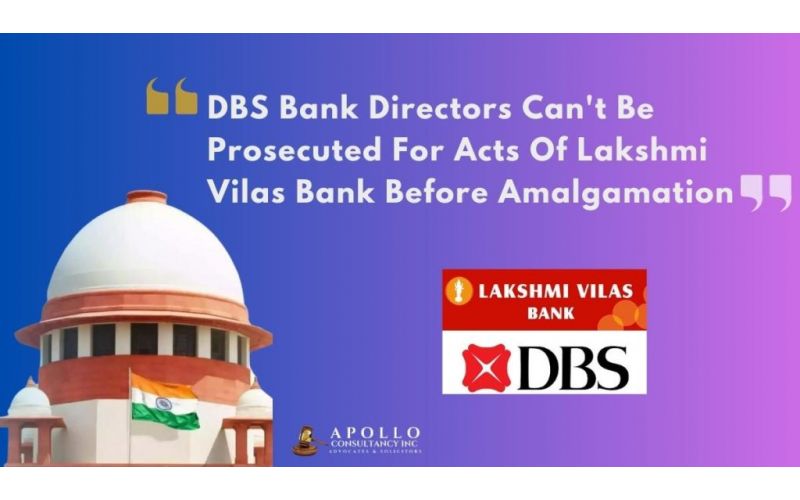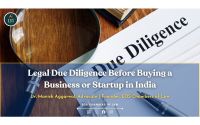DBS Bank Directors Can’t Be Prosecuted For Acts Of Lakshmi

DBS Bank Directors Can’t Be Prosecuted For Acts Of Lakshmi Vilas Bank Before Amalgamation : Supreme Court Quashes Criminal Case
The Supreme Court today ruled that DBS Bank and its directors, who were appointed after the amalgamation with Lakshmi Vilas Bank(LVB) and had their appointments approved by the Reserve Bank of India (RBI), cannot be held criminally liable for actions attributed to erstwhile directors of LVB.
The Court held, “In the present context, public confidence in the banking system was at stake when RBI stepped in and imposed a moratorium and asked DBS to take over the entire functioning, management, and assets of erstwhile LVB. To permit the prosecution of DBS for acts of LVB who are facing criminal charges would result in a travesty in justice. Therefore, pending criminal proceedings arising out of the FIR, to the extent it involves DBS and all consequent proceedings are hereby quashed. The impugned judgment is set aside. Appeal by DBS is allowed.”
The Supreme Court bench comprising Justices S Ravindra Bhat and Justice Aravind Kumar was hearing an appeal against a judgment of the Delhi High Court which had refused to quash supplementary charge sheet against the appellant(DBS Bank).
The key issue at hand was the interpretation of Clause 3(3) of the scheme announced by the Ministry of Finance, Department of Financial Services. This was with respect to criminal proceedings constituted against the transferor bank before the non-voluntary amalgamation.
The question is whether these cases will be moved to the new bank or not, with the aim of protecting the interests of the public, especially depositors
Clause 3(3) of the notification read as under:
3. Transfer of assets and liabilities and the general effect thereof.-
(1) If on the appointed date, any cause of action, suit, decrees, recovery certificates, appeals or other proceedings of whatever nature is pending by or against the transferor bank before any court or tribunal or any other authority (including for the avoidance of doubt, an arbitral tribunal), the same shall not abate, be discontinued or be ill any way prejudicially affected, but shall, subject to the other provisions of this Scheme, be prosecuted and enforced by or against the transferee bank:
Provided that where a contravention of any of the provision of any statute or of any rule, regulation, direction or order made thereunder has been committed by or any proceeding for a criminal offense has been instituted against, a director or secretary, manager, officer or other employee of the transferor bank before the appointed date, such director, secretary, manager, officer or other employee shall be liable to be proceeded against under such law and punished accordingly, as if the transferor bank, being a banking company had not been dissolved.
Before delving into the interpretation of this clause, the Supreme Court stressed the significance of protecting the interests of depositors, creditors, and the public who had invested in the ailing bank before its financial crisis. It noted that the primary aim of the amalgamation scheme was to secure the larger public interest in the health of the banking industry.
The court observed that scheme was framed to ensure that the interests of depositors, creditors and others invested in the erstwhile bank before its sickness in the general public are protected. It aims at securing larger public interest in the health of the banking industry. “Late intervention into the affairs of the bank can result in a run on it, resulting in a serious loss of confidence in the intricately woven banking and financial system. The overall objective of the scheme is to ensure recovering what is the bank’s dues and ensuring protection of creditors”, the Court said.
In the ordinary sense, criminal liability can neither be attributed to DBS nor its directors brought in after amalgamation and whose appointments were approved by RBI,” the judgment stated, emphasizing the clear distinction between the actions of DBS and those of LVB’s former leadership.
The Supreme Court further pointed out that the terms of the chargesheet indicated that criminal liability was being ascribed to DBS for actions undertaken by LVB’s former directors. It clarified that the individual responsibility and accountability of LVB directors under criminal law remained unaffected by the amalgamation.
“Therefore, there is no involvement of DBS Bank revealed in the chargesheet filed by Delhi police. In completely ignoring these aspects and proceeding on a rather superficial basis, the High Court, in our considered opinion, fell into error,” the Supreme Court stated, highlighting the High Court’s earlier judgment.
While acknowledging the importance of not lightly exercising the power to quash a criminal investigation, the Supreme Court underscored the significance of applying this power judiciously, particularly in cases where it is warranted to ensure justice is served.
The court opined “There is no gainsaying that power to quash a criminal investigation should not be lightly exercised, yet to recourse to that power in cases that require is being blind to justice which courts can scant afford to.”
Case title: DBS Bank India Ltd. v. State NCT of Delhi & Ors
Source
Post Categories
Featured Posts
Latest Posts
Latest Posts

Parliament Passes Forest (Conservation) Amendment Bill, 2023
After opposition walked out over their demands for discussion on Manipur Violence, the Rajya Sabha passed the contentious Forest (Conservation) Amendment Bill, 2023 today. It aims to amend certain provisions under the Forest (Conservation) Act, 1980, to extend and exempt ...

Digital Arrest: Navigating Cyber Crime Laws in India
In today's digital era, the concept of "digital arrest" has taken center stage, reflecting the evolving legal response to cyber crimes in India. With the rise in online fraud, hacking, cyberbullying, and identity theft, the need to protect citizens and ...

Adultery No Longer A Criminal Offence In India, Rules Supreme Court
The Rajya Sabha has passed the Jammu and Kashmir The court underlined that Section 497 treats women as properties of their husbands and is hence manifestly discriminatory. It trashed the central government’s defense of Section 497 that it protects sanctity ...

Supreme Court Says MP, MLA Can’t Claim Immunity From Prosecution On Charges Of Bribery
The seven-judge Constitution bench of the Supreme Court said it disagreed with the judgment in PV Narasimha and the judgment in PV Narasimha which grants immunity to legislators for allegedly bribery for casting a vote or speech has “wide ramifications ...

Supreme Court Stays High Court Order On Old Pension Scheme For Paramilitary Forces
The Supreme Court on Friday stayed the Delhi High Court judgment which held that the old pension scheme (OPS) will be implemented in the Central Paramilitary Forces (CAPF). During a brief hearing, a bench of Justices Sanjeev Khanna and Bela ...

Legal Challenges in Remote Work : Solicitors' Guide
Introduction: As remote work continues to redefine the modern workplace, it brings with it a host of legal considerations that businesses and employees must navigate. From data protection to employment law and contractual obligations, the shift to remote work presents ...

Speak With Our
Get a Appointment
















